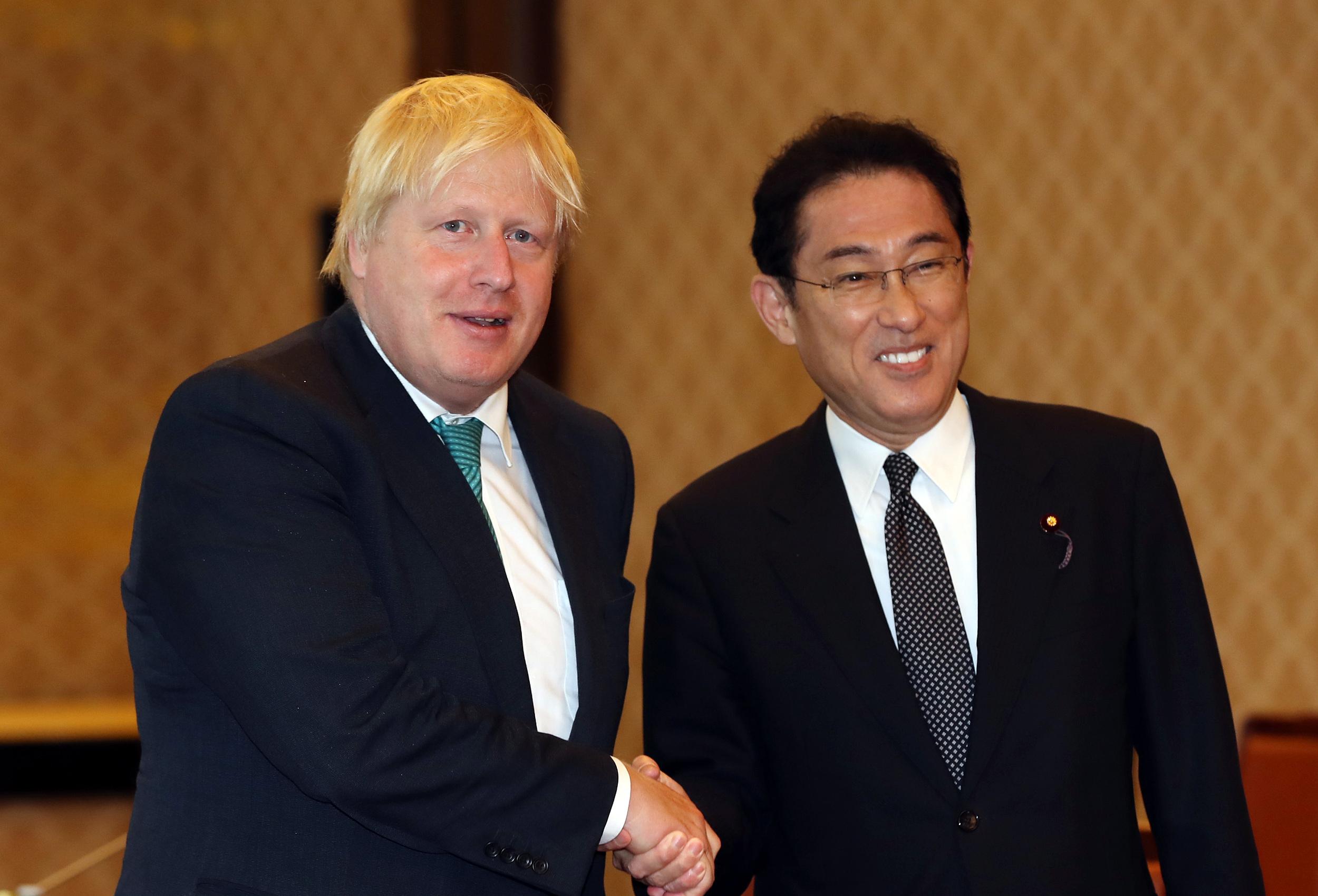According to the Japanese News Agency, on October 13, local time, British Prime Minister Boris Johnson and Japan's new Prime Minister Kishida Fumio had their first telephone conversation. During the call, Johnson congratulated Kishida on his election as prime minister and promised to consider lifting import restrictions on Japanese food.
Kishida said he hopes to lift restrictions on these products, including those produced in Fukushima Prefecture, as soon as possible based on scientific evidence.

On July 21, 2017, Johnson, then British Foreign Secretary, shook hands with Fumio Kishida, then Japanese Foreign Minister Image Source: Visual China
Fukushima Prefecture is located in northeastern Japan and is home to the Fukushima Daiichi Nuclear Power Plant, a subsidiary of tokyo electric power companies. On March 11, 2011, due to the earthquake and tsunami, a meltdown accident occurred at the Fukushima Daiichi Nuclear Power Plant, resulting in a large amount of radioactive material leaking.
After the accident, based on safety considerations, 54 countries and regions introduced restrictions on food imports to Japan. Among them, the ingredients produced in Fukushima Prefecture are even more colorful.
In June this year, due to the announcement by the Organizing Committee of the Tokyo Olympic and Paralympic Games in Japan that the Athletes' Village Restaurant contained Fukushima flounder in the ingredients, the South Korean Olympic delegation directly stated that in order to ensure the safety of the athletes' diet, it decided to bring its own box lunch and not to eat at the athletes' restaurant.
Even so, Western countries have begun to gradually push forward the decision to lift restrictions on Food Imports from Japan.
On September 21, Japan's Ministry of Agriculture, Forestry and Fisheries said that the European Union has planned to relax import restrictions on Japanese agricultural products and foodstuffs, and from October 10, exporters of bamboo shoots and cultivated mushrooms produced in Fukushima Prefecture will no longer need to submit radiation inspection certificates. At the same time, Iceland, Norway, Switzerland and Liechtenstein will also implement similar easing policies, introducing the same regulations as the European Union.
Kotaro Nogami, then Japan's Minister of Agriculture, Forestry and Fisheries, said at a press conference: "Japan will work tirelessly to promote the removal of import restrictions on [Japanese food] from other countries, including the European Union. ”
On September 22, the U.S. Food and Drug Administration (FDA) updated its statement saying that after an extensive analysis of Japan's strict food control measures, including decontamination, monitoring, and enforcement, and after reviewing the results of 10 years of sampling of Japanese foods, the FDA officially lifted all restrictions on food imports from Japan.
On April 13, local time, Fukushima Prefecture, Japan, aerial photo of the nuclear sewage silo of the Fukushima Daiichi Nuclear Power Plant Image source: Visual China
According to the Japan Broadcasting Corporation (NHK), in the 30-minute call between Johnson and Kishida Fumio, in addition to the issue of Fukushima Food, the two sides also talked about a series of Japanese-British cooperation.
The two sides agreed that security and defense cooperation between the two countries has deepened significantly in recent years, and the docking of the British aircraft carrier Queen Elizabeth at the US Naval Base near Tokyo in September this year shows that the cooperation between the two sides has reached a new level.
The two sides confirmed their commitment to an early conclusion of the Japan-UK Reciprocal Access Agreement to determine how joint exercises will be organized between the Japanese Self-Defense Forces and the British army.
In addition, the two sides agreed to work closely together to achieve freedom and openness in the Indo-Pacific region, address global climate change and COVID-19, and exchange views on ongoing negotiations on the UK's accession to the Comprehensive and Progressive Trans-Pacific Partnership (CPTPP).
This article is an exclusive manuscript of the Observer Network and may not be reproduced without authorization.